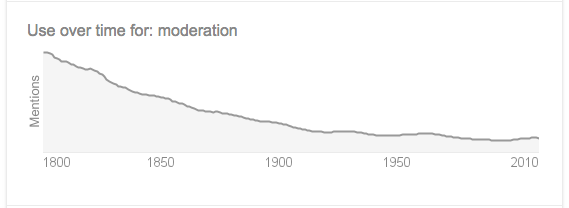You can eat fat by the pails of lard now, but no carbs. Or try an all-meat diet. Or just eat raw veggies. I have never understood diets. Or “lifestyles” as diets are now called. These days you’re not on a diet, you change your lifestyle. No longer are you buying into a temporary act, but a permanent change.
Ever notice how every diet has a detailed system for you to follow? Complexity is added so that a product is new and novel to the customer. The result is the answer. That thing you’ve been missing. You just didn’t know the right rules to follow.
I have a better lifestyle for you. It can be boiled down to one word, and that word is not FAT, MEAT, or RAW. This is a special word, a magic system that not only serves as a recipe for what you eat, but a playbook for how to live your life. This single word? The only rule you’ll ever need? This passphrase that unlocks decades of research you’ve never read? It’s moderation. Oh, so boring right? You probably think you’ve tried moderation before. That you gave it a fair shot and moderation did nothing for you. But you’d be wrong.
Moderation comes from the Latin “moderare” which means “to control.” It avoids excess and extremes, and encourages a life in the middle. Synonyms for moderate include self-restraint, self-control, self-command, and self-discipline. Which explains why we avoid moderation like the plague; we possess none of those things.

Back to food, the number of choices on what to eat alone are mind-boggling. The grocery store is a veritable jungle of sights and tastes and nutritional value competing for a place in our bodies and minds.
With so much choice, it’s no wonder we turn to diets – er, lifestyles – to reduce the number of decisions we have to make. Doesn’t it make it easier? Aren’t we special? So we believe. But the limits of one only encourage the excess of another. And the yo-yo-ing between these two extremes can be nauseating.
Under the facade of science, we tweak these lifestyles to ever-more detailed minutiae. Now add acai! Now subtract lactose! Armed with such complex rules the next time you open the fridge, you feel control. You’ve got this nut figured out. (Wait, can you eat nuts?)
But make as many food substitutions as you’d like, external rules will never be a replacement for your own self-discipline. Here’s the thing. You already know everything you need to be successful. Take a breath. You know the choices to make. We fill our time with personal development books and new tomes on eating and the latest green smoothie recipe because we don’t trust ourselves, maybe don’t even like ourselves. (And hey, that’s a good instinct to have; companies are now spending millions and billions of dollars perfecting the addictive crunch of a chip until the whole bag is gone, the auto-play of the next episode until you’ve watched the entire season, the notification alert until all of your time is spent.)
We do need rules, tricks and defenses to put up against the new, the shiny, the distractions, the temptations – even if those are couched in kale and productivity. Extremes are extremes, no matter which end of the spectrum they lie. So break out your arsenal. Just be careful you aren’t trading one extreme for another. Don’t fear one extreme so much that you live under the supposed protection of another. When in doubt, eat a donut.
Moderation is a simple concept. There is nothing that cannot be moderated. Your actions, your desires and thoughts can all live by one simple rule, one magic system. But we don’t do it. I think that’s because moderation is not fun in the moment. But smart people know moderation need not exist in every moment, only over time. The moments stacked one on top of another become a fortress against the latest fads, diets and lifestyles. All good things come over time.
So the next time someone asks you, instead of saying you’re “fasting” or “juicing,” just say you’re “moderating.” People might chuckle, roll their eyes in exasperation, or secretly be glad they know the latest research that you are clearly unaware. But keep trucking on, eating your your cheese and your beans and your brussel sprouts and your chocolate almonds, and f*cking enjoy your life.
